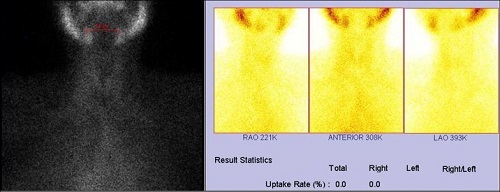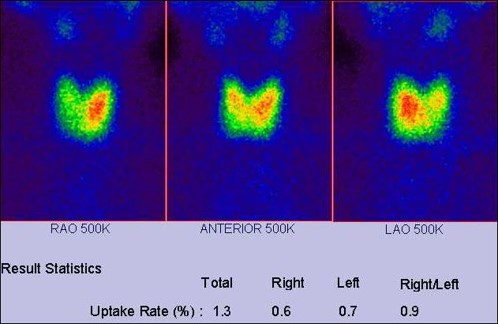CASES OF THE WEEK – “BONE SPECT-CT imaging of obscure foot and ankle pain” by Dr ShekharShikare, HOD & Consultant, Nuclear Medicine, NMC Royal Hospital Sharjah (short cases)
Thyroid-Related Complications of Amiodarone-The role of Nuclear Medicine (short cases).
What Is Amiodarone
Amiodarone (CORDORONE) is a type of drug that is classified as an antidysrhythmic medicine. These diseases can be fatal and cause the death of the patient without appropriate treatment. Examples of the disease include Atrial fibrillation, ventricular tachycardia and ventricular fibrillation that becomes persistent. This drug is considered one of the most effective treatment options for these conditions.
.Thyroid-related complications of Amiodarone
The problem with Amiodarone3 is that it contains a relatively large concentration of iodine. In fact, approximately 37% of this drug consists of iodine. Additionally, the chemical structure of Amiodarone is similar to the structure of T4 or thyroxine, which is one of the hormones produced by the thyroid gland. Up to 17% of the iodine in this drug is released into the body as a biologically available form, often also referred to as being “free iodine. One dose of 200mg Amiodarone causes the patient’s body to be exposed to a level of iodine that is approximately 100 times higher than what is recommended daily. The free iodine then collects in adipose tissue, as well as in muscle tissue, the lungs, liver, and the patient’s thyroid gland, the fact that the iodine collects in the thyroid gland is where the problem comes in. Once administered to the patient, the iodine that the medication causes to accumulate in the patient’s body can remain there for as long as nine months. In up to 18% of these patients, complications with the thyroid gland will develop. The primary concern with Amiodarone regarding thyroid malfunction is Hyperthyroidism. Even though Hypothyroidism is also relatively common among the general population, this is not a concern when it comes to considering possible complications in patients who are given Amiodarone to treat an irregular heartbeat.Another condition that can develop as a complication of Amiodarone is thyrotoxicosis. This condition refers to an excessive number of thyroid hormones accumulating in tissues throughout the body. When these conditions develop due to the administration of Amiodarone, then the patient will be diagnosed with either Amiodarone-induced thyrotoxicosis or Amiodarone-associated hyperthyroidism.
Treating thyroid disorders in patients taking Amiodarone
Amiodarone-induced thyrotoxicosis (AIT) may be divided into two main forms: type 1, a form of iodine-induced hyperthyroidism (Jod-Basedow phenomenon), which is treated with Radioactive Iodine ablation/ antithyroid drugs and type 2, a drug-induced destructive thyroiditis, which is treated with glucocorticoids. Because the treatment varies with the type of thyroiditis, distinction of these conditions is important.
Isotope thyroid scan can help discriminate between these two entities.
Case 1 (Type II)
54 years old female is on Cordarone medication since long for her intractable atrial fibrillation. Recently found to have abnormal thyroid functions tests (suppressed TSH values, Border line elevated FT4 and in normal range FT3
99mTc Thyroid scan shows ill-defined thyroid gland with poor tracer uptakes.
Tc uptakes 0.0% (0.4% to 3.0%), favors type II amiodarone induced subacute thyroiditis.

Case 2 (Type I)
67 years old female is on Cordarone medication since last two years for atrial fibrillation. Recently found to have abnormal thyroid functions tests, TSH 0.01 miu /ml (0.4- 4.5), FT4 1.82 ng/ml (0.7- 1.6) and FT3 432 ng/ml (230-420)
99MTC THYROID SCAN SHOWS PATCHY AND RELATIVELY INHOMOGENEOUS TRACER DISTRIBUTION.
Tc uptakes 1.3% (0.4% to 3.0%), favors type I amiodarone induced hyperthyroidism (jod basedow phenomenon).

Conclusion
Thyroid dysfunction, of which hyperthyroidism and hypothyroidism are the most common, can have serious complications when a patient is not treated promptly and with the correct dosage of the appropriate medications. The high iodine content in Amiodarone has been shown to contribute to both thyroid disorders and can often yield more serious effects as compared to thyroid dysfunction caused by other factors. Frequent monitoring of the patient’s thyroid levels, as well as TSH levels, can help to recognize an increase or decrease in thyroid function early on. This will help to initiate treatment early and avoid the development of complications.



